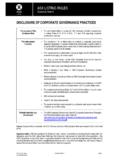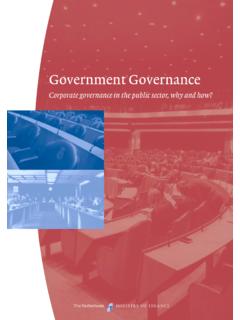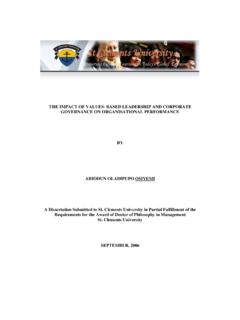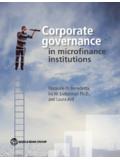Transcription of Corporate Governance Report Daiwa Securities Group Inc.
1 -1 - Cor porate Governance Report Last Update: August, 24, 2018 Daiwa Securi ties Group Inc. President and CEO Seiji Nakata Contact: 03-5555-1111 Securities C ode: 8601 The Corporate Governance of Daiwa Securities Group Inc. (the Company ) is described below. I. Basic Views on Corporate Governance , Capital Structure, Corporate Profile andOther Basic Information1. Basic ViewsThe Company is a Group management holding company which aims to meet a highly transparent and objective Governance system that is in line with international standards. Furthermore, the Company aims to achieve highly efficient and specialized supervision of Group companies, and is building a unified Group management system which demonstrates the synergy of e ach gr oup company.
2 The Company has adopted the organizational form of a company with Three Committees with a view to (a) improving the mobility of decision-making by significant delegation of authority from the Board of Directors to the Corporate Executive Officers (Shikkoyaku) and clarifying the division of the duties among the Corporate Executive Officers (Shikkoyaku); (b) enhancing the transparency of the management by establishing Three Committees (Nominating Committee, Audit Co mmittee and Compensation Committee) of which Outside Directors hold the majority a nd Chairman and making the supervisory function of the Board of the Directors more efficient by inviting highly specialized Outside Directors; and (c) exerting management oversight function by the advice, etc.
3 Given from the third point of view, which is based on each insight and experience of highly independent and ethical Outside Directors, in the Board of Directors and the Three Co mmittees. Furthermore, the Company positively addresses CSR activ ities in order to earn trust from all of the stake holders. There are indeed various aspects to CSR, such as providing superior products, services, and sincere responses to customers; returning profits appropriately and disclosing information to shareholders; measures for labor environment and evaluation of the employees; establishing legal compliance and Corporate ethics; environmental management; as well as social contribution.
4 The Company believes that these approaches, together with a strengthened Corporate Governance system which emphasizes transparency, mobility and efficiency will lead to the sustainable improvement of the Corporate value. The Corporate Governance system of the Company consists of (i) the Board of Directors and the aforesaid Three Committees (Nominating Committee, Audit Committee, and Compensation Comm ittee) as a supervising body, (ii) Executive Management Committee and its subcommittees (Gr oup Risk Management Committee, Disclosure Committee, Group IT Strategy Committee, and Overs eas Management Committee) as an executive b ody, and (iii) Group Internal Audit Committee, This document has been translated from the Japanese original (as submitted to the Tokyo Stock Exchange) forreference purposes only.
5 In the event of any discrepancy between this translated document and the Japanese original, the original shall prevail. Daiwa Secur ities Group Inc. assumes no responsibility for this translation or for direct, indir ect or any other forms of damages arising from the translation. - 2 - which is in direct control of the CEO as an internal audit body. [Reasons for Non-compliance with the Principles of the Corporate Governance Code] The Company complies with all principles of the Corporate Governance Code. [Disclosure Based on the Principles of the Corporate Governance Code] Principle 1-4 Strategic Shareholding Shares The Company and Daiwa Securities Co.
6 Ltd. hold the strategic shareholding shares only when it is significant to hold such shares. A significant case occurs when holding such shares is deemed to enhance the Corporate value of the Company Group in light of factors such as profitability, growth potential, strengthening and maintaining business relations, etc. With regard to the main strategic shareholding shares, the significance of such shareholding is regularly verified and reported to the Board of Directors. With regard to the exercise of the voting rights of strategic shareholding shares, the Company carefully determines whether or not each proposal should be approved taking into account the need to enhance medium to long term Corporate value of both the strategic shareholding company and the Company Group .
7 Principle 1-7 Transactions between Related Parties In order to avoid any prejudice to the Company and the common interests of its shareholders, the Company has established Regulations of the Board of Directors that a prior approval of the Board of Directors is necessary in cases where the Company conducts transactions with the Directors or Corporate Executive Officers (Shikkoyaku) of the Company or major shareholders, etc., unless the terms and conditions of the transactions are the same as those of general transactions. Principle 3-1 Enhancement of Information Disclosure (1) The Company enacts and discloses the Corporate Principles.
8 The Company also has developed and disclosed Medium-Term Management Plan on its website. Corporate Principles Medium-Term Management Plan (2) The basic views on Corporate Governance of the Company Group are described in I. 1. Basic Views of this Report . (3) The Company decides on the policy regarding the compensation of the Directors and Corporate Executive Officers (Shikkoyaku) in the Compensation Committee and has disclosed the policy on the Notice of Convocation of the Ordinary General Meeting of Shareholders, Securities reports, and II. 1. Organizational Composition and Operation, etc. of this Report . (4) With regard to the election of Directors, the Nominating Committee, which is made up of a majority of Outside Directors, determines the candidates for the Directors.
9 An overview of the procedure is disclosed in Securities reports and II. 2. Matters on Functions of Business Execution, Auditing, Oversight, Nomination and Remuneration Decisions (Overview of Current Corporate Governance System) of this Report . (5) The reasons for the election of Directors, including the Director holding concurrent post of - 3 - representative Corporate Executive Officer (Shikkoyaku), are explained in the appendix of this Report . With regard to the Outside Directors, the reasons for election are described on Reasons for Appointment of Outside Directors Relationship with the Company (2) of Outside Directors of II.
10 1. Organizational Composition and Operation, etc. of this Report . Supplemental Principle 4-1-1 Scope of Delegation to the Managers In order to promote swift decision-making and efficient Group management, the Board of Directors of the Company delegates the decision-making authority regarding the execution of operations to the Corporate Executive Officer (Shikkoyaku) or the Executive Management Committee, which is comprised of the Corporate Executive Officers (Shikkoyaku), except for the matters that, according to the laws and regulations, have to be decided by the Board of Directors. Principle 4-8 Effective Utilization of Independent Outside Directors The Company has a policy that the Board of Directors shall consist, in principle, of two or more elected Independent Outside Directors which constitute equal to or more than one third of the Board of Directors.

















